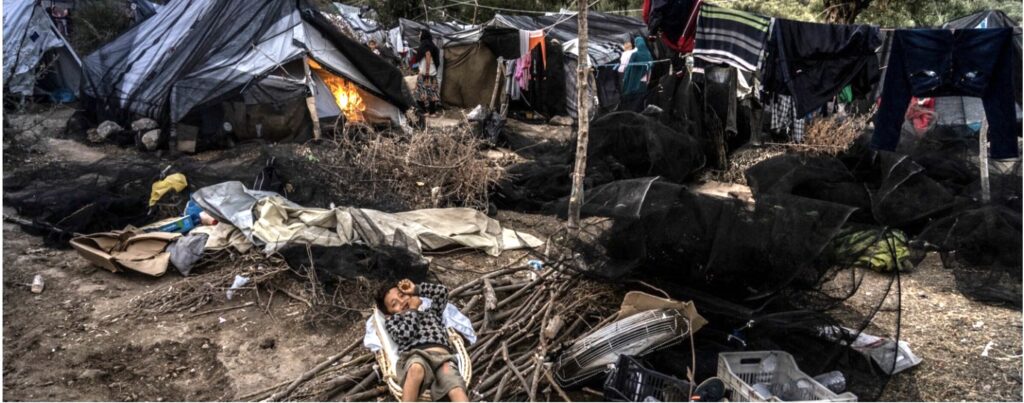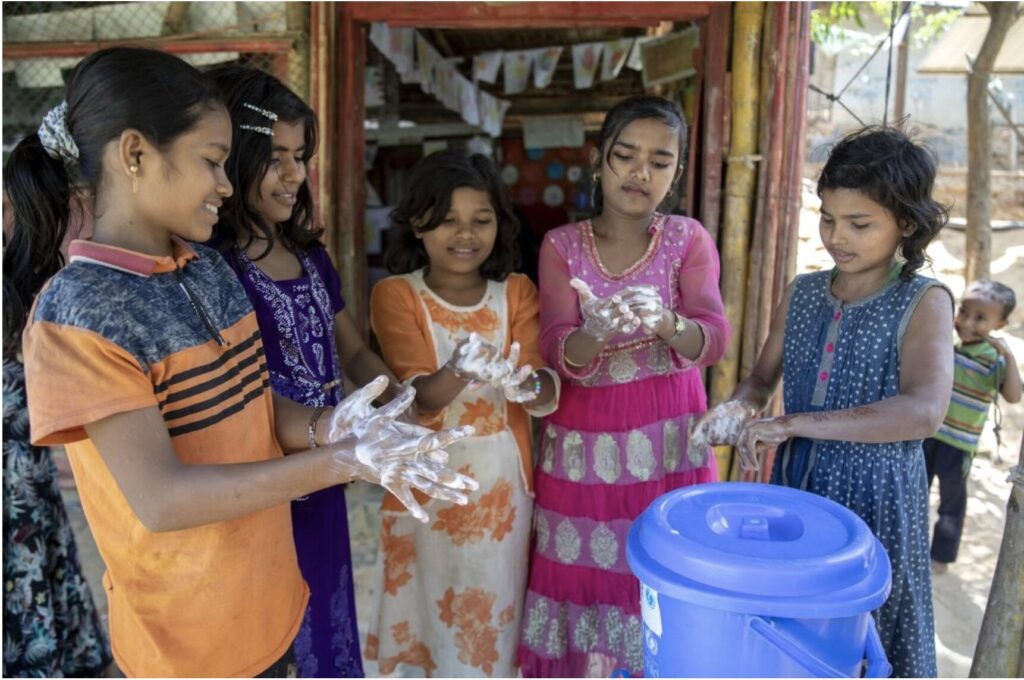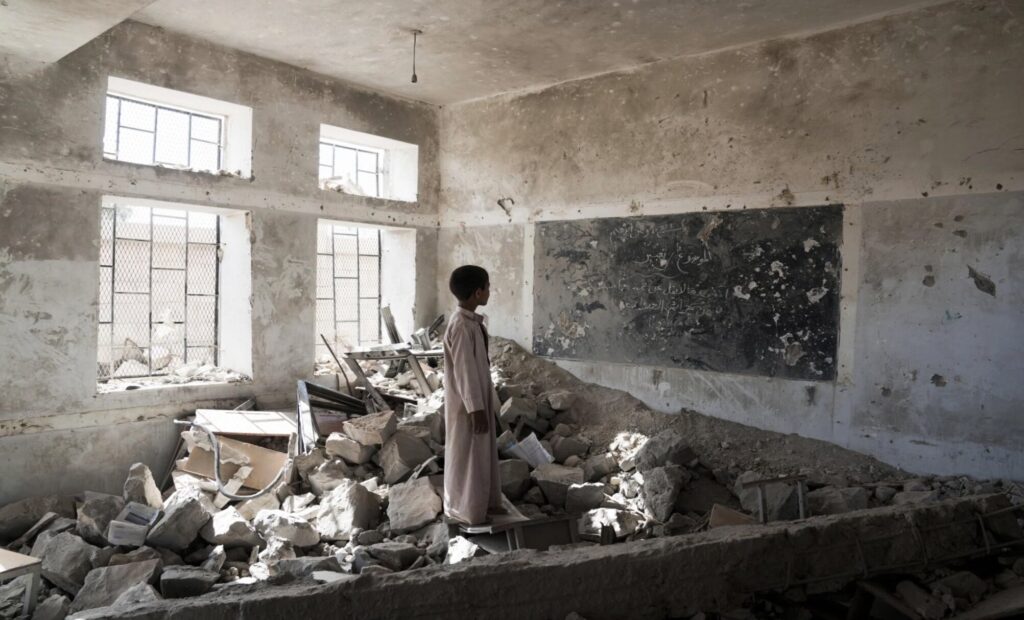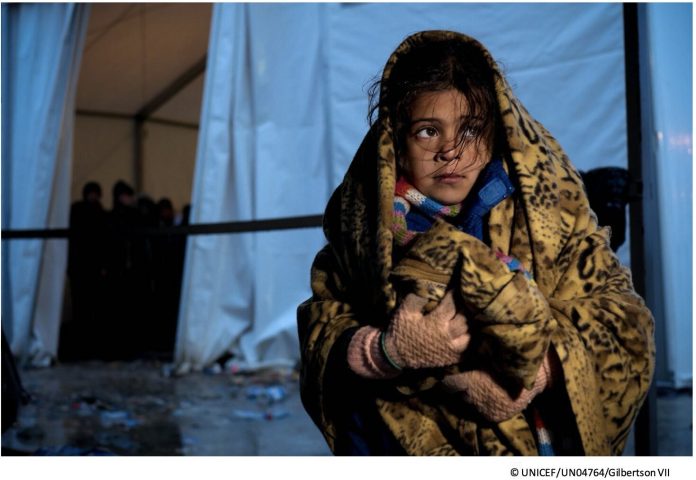Humanitarian organisations say stateless refugee children are ‘not treated as humans, but numbers’
Médecins Sans Frontières is among humanitarian organisations calling for help as a shortage of funds threatens severe death tolls and a violation of basic human rights in Europe’s largest refugee camps in Greece.
In addition to humanitarian aid needed to fight the pandemic, in the week of September 8, two devastating fires swept across one Moria camp in Greece leaving more than 12,000 people homeless. Thousands of people were forced into the street with no assistance, no hygiene measures and no sanitation facilities available in the middle of the pandemic.
The fires might be a wakeup call for the EU to change its migration policy and an opportunity to make real change.
The five Aegean islands in Greece host over 38,000 refugees living in a 6000-capacity enclosure. The overcrowded conditions in the camps, especially during the pandemic, are a major concern.
Greece recorded its first positive covid-19 cases in Moria last month. But the risk of transmission is high as more than 17,000 people are packed in overcrowded tents and containers.
Aurelie Ponthieu, MSF Humanitraian Advisor on Displacements in a statement said: “We can only hope that the same system of inhumane containment will not be reborn from the ashes of Moria.”
In Greece, 5200 of the 38,000 refugees, are unaccompanied children.
Refugees in the island camps face a major threat from spread of the pandemic as overcrowding and sanitation remain the biggest problems in the camps.

With just one water tap for every 1300 people and no soap it is nearly impossible to practice frequent hand washing, and the crowded conditions prohibit social distancing.
“Forcing people to live in overcrowded and unhygienic camps as part of Europe’s containment policy was always irresponsible but now more than ever due to the COVID-19 threat,” Dr Apolostos Veizis, MSF director of Medical Operational Support Unit told the Guardian .
“These people are not treated as humans but numbers. The situation for them is utterly inhumane,” Dr Veizis said.
Refugee children are most vulnerable to the effects of COVID-19, and more than 13 million child refugees are living in camps and overcrowded settlements around the world.
A UNICEF analysis reported that more than 77 per cent of children under the age of 18 worldwide are living in one of 132 countries with COVID-19 movement restrictions.
An estimated 800 children aged under five die every day from diarrhea related to inadequate access to water, sanitation and hygiene services (WASH). This number could rise as WASH services remain a big challenge in refugee camps during COVID-19.
Henrietta Fore, UNICEF’s executive director, said in a statement that an estimated 6,000 children will die every day over the next six months as coronavirus has weakened national health systems and disrupted vital services.
“Stateless children and children in detention centres are among the most vulnerable to COVID-19,” said Ms Fore.
“These children are highly susceptible to neglect, abuse and gender-based violence (GBV), especially if staffing levels or care are negatively impacted by the pandemic or containment measures.”
A UNHCR report reveals that a stateless child is born every 10 minutes resulting in more than 70,000 stateless children born each year.
COVID-19 will affect children in three ways according to UNICEF’s Pandemic Report: they could contract the virus; authorities will find it challenging to stop virus transmission given the overcrowded camp conditions; and the pandemic could delay the implementation of the UN’s Sustainable Development Goals (SDG) due to travel restrictions of humanitarian workers, and lack of sufficient infrastructure and equipment for distant learning as well as access to health care.

The pandemic hinders all the UN’s SDG goals: it pushes people into poverty; increases need for access to clean water and sanitation; pressures people to avoid hospital unless necessary; restricts access to quality education; stalls progress on gender equality; and slows down efforts to create decent workplaces and economic growth.
Already there is evidence of the pandemic’s impact on refugee children in three countries: Yemen, Bangladesh, and Greece.
Yemen, an active war zone and with the worst humanitarian crisis, was suffering from a shortage of funds and aid even before the pandemic.
More than 75 per cent UN programmes have reduced operation in Yemen, and only 189 out of the 369 UN-funded hospitals are functioning nationwide. The World Food Programme has also reduced the ration by half in Yemen.
The shortage of funds in Yemen is due to several reasons, the biggest of which is the obstruction of Houthi rebels who control the capital, Sanaa. The US, who was Yemen’s biggest donor, has decreased its funding due to the Houthi interference.
The war in Yemen displaced some 3.6 million people, and women and children were the most affected. According to UNICEF, more than 12 million children and six million women of childbearing age need humanitarian assistance since the escalation of war in March 2015.
The people live in unsanitary and overcrowded camps making it impossible to practice physical distancing and other measures to contain COVID-19. Yemen currently has 2,051confirmed COVID-19 cases and 593 deaths.
The UN and other humanitarian agencies are seeking $2.41 billion to fight COVID-19 in Yemen and in other places suffering under the worst humanitarian conditions.
Similarly, camps in Bangladesh are among the most overpopulated and with inadequate living conditions.
Save the Children is urgently calling on international organisations to provide funds and medical resources in the Rohingya camps, said Athena Rayburn, Save the Children’s Senior Advocacy Manager in Cox’s Bazaar: “Inaction could lead to a disastrous and preventable loss of life.”
Children make up 50 per cent of the total Rohingya Population of 860,175 refugees. Rohingya refugees, as a stateless population, pose more challenges because in more than 30 countries children need nationality documentation to receive medical care.
Basic human rights such as access to formal education, healthcare and severe restrictions on their freedom of movement should not be the way Rohingya refugee children spend their lives, said Ms Rayburn: “A refugee camp is no place for a child to grow up.”
Paul Brockmann, Médecins Sans Frontières (MSF) country representative in Bangladesh said the spread of rumours and misinformation in the camps is endangering people’s access to care. He said a frightening rumour circulating among Rohingya refugees is that if they are found to have COVID-19, they will be taken from their families and killed.
Caroline Willemen, MSF field coordinator for COVID-19 in a statement said: “What is happening is that COVID-19 is being used as an excuse to limit the freedom and rights of people who are seeking safety.”

Apart from inadequate WASH services and funds in refugee camps worldwide, education poses the greatest risk for children.
School closure will impact girls more drastically as it could pave a path towards child marriage, Gender based violence and eventually completely dropping out of school in times of expected economic downturn.
Going to school was already a challenge for most refugee children and now that they will be out of school for a prolonged period, aid workers worry some may never return.
“Before COVID, two million children were out of school. Now because of the pandemic, an additional five million children are out of school, said Ms Fore, UNICEF’s executive director.
“The longer children are out of school, the less likely they are to return,” she said.
Humanitarian agencies are actively providing WASH and mental help services for refugee children but travel restrictions and lack of funds pose a huge challenge to provide aid to the most vulnerable.
MSF’s International President, Dr Christos Christou, said their key priority was to keep regular medical programs running for the extremely vulnerable communities MSF supports around the world. But the current travel restrictions limit MSF’s ability to move staff between countries.
MSF is currently promoting health information in the Greek camps, but provision of water and sanitation services are essential. New recruitment of extra medical, paramedical and support staff, and the acquisition of the necessary equipment, is also urgent.
Stephan Oberreit, MSF head of mission in Greece said in a statement: “ Five years of cumulated and publicly-available evidence [proves] that inhumane reception conditions, unfair asylum procedures only lead to cyclical disaster and unmeasurable suffering.
“Enough is enough. Decent solutions are possible… The time has come for EU countries to recognise the failure of deterrence policies.”
Overall, the pandemic could crush hard won goals and global efforts to provide access to protection, healthcare and education for refugee children.
As restrictions ease and life slowly returns to normal for most of us, for some, at best, that will be simply a return to the war and inhumanity they already know


